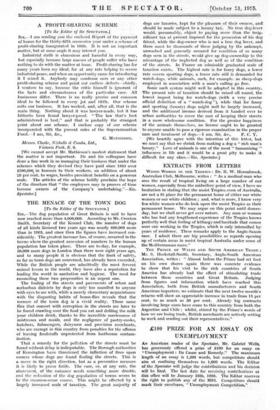THE MENACE OF THE TOWN DOG
[To the Editor of the SPECTATOR.]
Snt,—The dog population of Great Britain is said to have now reached more than 4,000,000. According to Mr. Croxton Smith, Secretary of the Kennel Club, the number of dogs of all kinds licensed two years ago was nearly 800,000 more than in 1905. and since then the figures have increased con- siderably. The greatest increase has, of course, occurred in the towns where the greatest accession of numbers to the human population has taken place. There are to-day, for example, 50,000 more dogs in London than there were eight years ago, and to many people it is obvious that the limit of safety, so far as town dogs are concerned, has already been exceeded. While the British people are admittedly the most fervent animal lovers in the world, they have also a reputation for leading the world in sanitation and hygiene. The need for reconciling these two propensities is an urgent one.
The fouling of the streets and pavements of urban and surburban districts by dogs is only too manifest to anyone with eyes to see with, while a merely elementary acquaintance with the disgusting habits of house-flies reveals that the menace of the town dog is a vivid reality. Those same flies that consort with corruption in the streets are later to be found crawling over the food you eat and defiling the milk your children drink, thanks to the incredible carelessness of mistresses and maids, and the negligence of pastry-cooks, butchers, fishmongers, dairymen and provision merchants, who are exempt in this country from penalties for the offence of leaving foodstuffs unprotected from loathsome contam- ination.
That a remedy for the pollution of the streets must be found without delay is -indisputable. The Borough authorities of Kensington have threatened the infliction of fines upon owners whose dogs are found fouling the streets. This is a move in the right direction, but as a preventive measure it is likely to prove futile. The cure, or, at any rate, the abatement, of the nuisance needs something more drastic, and the redaction of the dog population of towns seems to be the common-sense course. This might be effected by a largely increased scale of taxation. The great majority of
dogs are luxuries, kept for the pleasure of their owners, and should be made subject to a luxury -Lai. No true dog-lover would, presumably, object to paying more than the insig-. nificant tax at present imposed for the possession of his dog friend, while the dog-owner who is not a true dog lover, and there must be thousands of these judging by the unkempt, unwashed and generally uneared for condition of so many dogs seen in the- streets, would give. up dog-ownership to the advantage_ Of the neglected dog as well as of the condition _ of the streets. In France an admirable graduated scale of, taxation exists. The highest rate is for fancy dogs, a lower rate covers sporting dogs, a lower rate still is demanded for watch-dogs, while animals, such, for example. as sheep-dogs employed in association with a man's calling- go free.
Some such system might well be adopted in this country. The present rate of taxation should be raised all round, the lowest impost being for watch-dogs (with a very precise official definition of a " watch-dog "), while that for fancy and sporting (luxury) dogs might well be largely increased, and the additional income derived from it handed over to urban authorities to cover the cost of keeping their streets _ in a more wholesome condition. For the greater happiness of the animals themselves, no licence ought to be granted ' to anyone unable to pass a rigorous examination in the proper care and treatment of dogs.—I am, Sir, &e., F. C. Y.
[We heartily agree with the intention of this letter, but we must say that we shrink from making a dog a " rich man's luxury." Love of animals is one of the most " humanizing " influences in life and it would he a great pity to make it difficult for any class.-- EP. Spectator.]






























































 Previous page
Previous page